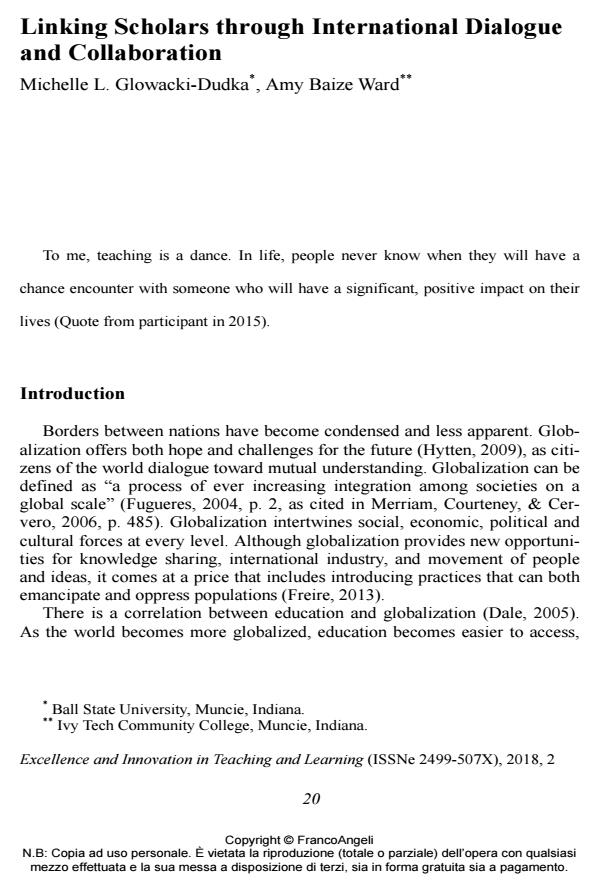Linking Scholars through International Dialogue and Collaboration
Journal title EXCELLENCE AND INNOVATION IN LEARNING AND TEACHING
Author/s Michelle L. Glowacki-Dudka, Amy Baize Ward
Publishing Year 2018 Issue 2018/2 Language English
Pages 18 P. 20-37 File size 179 KB
DOI 10.3280/EXI2018-002002
DOI is like a bar code for intellectual property: to have more infomation
click here
Below, you can see the article first page
If you want to buy this article in PDF format, you can do it, following the instructions to buy download credits

FrancoAngeli is member of Publishers International Linking Association, Inc (PILA), a not-for-profit association which run the CrossRef service enabling links to and from online scholarly content.
International dialogue and sharing student experiences can help develop empathy and cultural understanding. This article shares the cross-cultural experience of American doctoral students and recent adult education alumni from Ireland. We examined how the opportunity for international dialogue became an example of transformative and intercultural learning. Through technology, learners engaged to gain a deeper understanding of each other’s personal narrative. The students also recognized how the educational systems in each nation has impacted their learning journeys.
Keywords: Comparative adult education, intercultural dialogue, transformative learning
- Clandinin, D. J., & Connelly, F. M. (2000). Narrative Inquiry: Experience and Story in Qualitative Research. San Francisco, CA: Jossey-Bass.
- Clandinin, D. J., & Rosiek, J. (2007). Mapping a Landscape of Narrative Inquiry: Borderland Spaces and Tensions. In Clandinin, D. J. (Ed.), Handbook of Narrative Inquiry: Mapping a Methodology (pp. 35-75). Thousand Oaks, CA: Sage.
- Crick, N. (2009). The Search for a Purveyor of News: The Dewey/Lippmann Debate in an Internet Age. Critical Studies in Media Communication, 26, 480-497, DOI: 10.1080/15295030903325321
- Connolly, B. (2007). Beyond the Third Way: New Challenges for Critical Adult and Community Education. In Connolly, B., Fleming, T., McCormack, D., & Ryan, A. (Eds.), Radical Learning for Liberation 2 (pp. 110-130). Maynooth, Co Kildare, Ireland: MACE Press.
- Counsel of Europe (COE) (2015). Intercultural Dialogue: Objectives and Conditions, -- https://www.coe.int/t/dg4/intercultural/concept_EN.asp.
- Creswell, J. W. (2013). Qualitative Inquiry & Research Design: Choosing among Five Approaches. Thousand Oaks, CA: Sage.
- Cunningham, S. (2015). The Well of the Educator: An Investigation into how Well-being is Maintained by Educators working in Youthreach (Thesis). Maynooth University, Ireland.
- Dale, R. (2005). Globalisation, Knowledge Economy, and Comparative Education. Comparative Education, 41, 117-149.
- Detlefsen, K. (1998). Diversity and the Individual in Dewey’s Philosophy of Democratic Education. Educational Theory, 48, 309-329.
- Denzin, N. K., & Lincoln, Y. S. (2011). The Sage Handbook of Qualitative Research. Thousand Oaks, CA: Sage.
- Field, J. (1999). Schooling, Networks and the Labour Market: Explaining Participation in Lifelong Learning in Northern Ireland. British Educational Research Journal, 25, 501-516, DOI: 10.1080/0141192990250406
- Frambach, J. M., Driessen, E. W., Chan, L.-C., & Van Der Vleuten, C. P. M. (2012). Rethinking the Globalisation of Problem-based Learning: How Culture challenges Self-directed Learning. Medical Education, 46, 738-747,
- Freire, P. (1994). Education for Critical Consciousness, New York, NY, Contimuum Publishing.
- Freire, P. (2013). Pedagogy of the Oppressed, New York, NY, Bloomsbury Academic.
- Goodman, A. (2002). Transformative Learning and Cultures of Peace. In O’Sullivan, E. V., Morrell, A., & O’Connor, M. A. (Eds.), Expanding the Boundaries of Transformative Learning: Essays on Theory and Practice (pp. 185-198). New York: Palgrave.
- Grummel, B. (2007). The “Second Chance” Myth: Equality of Opportunity in Irish Adult Education Policies. British Journal of Educational Studies, 55, 182-201,
- Harvey, D. (2005). A Brief History of Neoliberalism. Oxford-New York: Oxford University Press.
- Hickling-Hudson, A. (2014). Striving for a Better World: Lessons from Freire in Grenada, Jamaica and Australia. International Review of Education, 60, 523-543,
- Hickman, L. A. (2009). John Dewey at 150: Continuing Relevance for a Global Milieu. Educational Theory, 59, 375-378,
- Hytten, K. (2009). Deweyan Democracy in a Globalized World. Educational Theory, 59, 395-408,
- Merriam, S., Courtenay, B., & Cervero, R. (2006). The Role of Adult Education in Addressing Global Issues. In Merriam, S., Courtenay, B., & Cervero, R. (Eds.), Global Issues in Adult Education (pp. 485-496). San Francisco, CA: Jossey-Bass.
- Mezirow, J. (1991). Transformative Dimensions of Adult Learning. San Francisco, CA: Jossey-Bass.
- Müller, W. (2014). Educational Inequality and Social Justice: Challenges for Career Guidance. International Journal for Educational and Vocational Guidance, 14, 21-33,
- Murray, M., Grummell, B., & Ryan, A. (2014). Further Education & Training: History, Politics, Practice. Maynooth, Co Kildare, Ireland: MACE Press.
- Oni, C. S. (2005). Comparative Adult Education: The Nature and Approaches. Journal of Social Science, 11 (3), 243-248, DOI: 10.1080/09718923.2005.11892520
- O’Sullivan, E. V., Morrell, A., & O’Connor M. A. (Eds.) (2002). Expanding the Boundaries of Transformative Learning: Essays on Theory and Practice. New York: Palgrave.
- Reischmann, J., & Bron jr, M. (Eds.) (2008). Comparative Adult Education 2008: Experiences and Examples. Frankfort, Germany: International Society for Comparative Adult Education (ISCAE).
- Savin-Baden, M., & Howell Major, C. (2013). Qualitative Research: The Essential Guide to Theory and Practice. New York, NY: Routledge.
- Selby, D. (2002). The Signature of the Whole: Radical Interconnectedness and Its Implications for Global and Environmental Education. In O’Sullivan, E. V., Morrell, A., & O’Connor M. A. (Eds.), Expanding the Boundaries of Transformative Learning: Essays on Theory and Practice (pp. 77-93). New York: Palgrave.
- Shields, N. (2004). Understanding Place-bound Students: Correlates and Consequences of Limited Educational Opportunities. Social Psychology of Education, 7, 353-376,
- Smala, S. (2012). The Governmentality of Reconciliation: Adult Education as a Community Relations Technique in Northern Ireland. Discourse: Studies in the Cultural Politics of Education, 33, 283-297, DOI: 10.1080/01596306.2012.666081
- United Nations Educational, Scientific and Cultural Organization (UNESCO) (1977). The General Conference adopts Recommendation on Adult Education. Adult Education Information Notes, 1.
- Webb, D. (2009). Where’s the Vision? The Concept of Utopia in Contemporary Educational Theory. Oxford Review of Education, 35, 743-760, DOI: 10.1080/03054980903371179
Michelle L. Glowacki-Dudka, Amy Baize Ward, Linking Scholars through International Dialogue and Collaboration in "EXCELLENCE AND INNOVATION IN LEARNING AND TEACHING" 2/2018, pp 20-37, DOI: 10.3280/EXI2018-002002